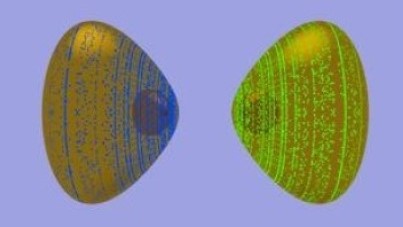Dr Dan Loughran
Dr Dan Loughran has been named among the UK’s most promising science and research leaders, securing a UKRI Future Leaders Fellowship. Dr Loughran will use tools from geometry and number theory to tackle important open problems in the field of Diophantine equations. Originally viewed as a curiosity from antiquity, these equations have found spectacular applications to modern society and underlie much of internet security.
Dr Loughran said: “I'm honoured to be awarded the Future Leaders Fellowship; it feels a bit like winning the lottery! The fellowship will allow me to realise my ambitious research programme and full potential as a leader, and create a new world-leading centre for number theory.”
UKRI Future Leaders Fellowships support talented people in universities, businesses, and other research and innovation environments, who can apply for up to £1.5 million to support their research and develop their careers. They also allow universities and businesses to develop their most talented early career researchers and innovators or to attract new people to their organisations. The aim of the scheme is to develop the next wave of world-class research and innovation leaders in academia and business. Each fellowship lasts from four to seven years.
Dr Sarah Penington
A prestigious Royal Society University Research Fellowship scheme has been awarded to Dr Sarah Penington for her work studying branching processes and their applications to understanding patterns of genetic variation in real-world populations.
Dr Penington works in probability theory, studying mathematical models motivated by population genetics. Her research aims to determine the structure of family trees in simplified models that capture key features of real-world populations. These results can then be used by population geneticists to compare with data collected in the field (such as from snapdragon populations in hybrid zones). Dr Penington aims to prove mathematically that certain genealogical features appear in models of populations undergoing natural selection.
Following her success, Dr Penington said "My research aims to identify robust methods based on mathematical proofs to determine the long-term behaviour of particle systems used to model populations. I find this research hugely rewarding because it combines the rigour, elegance and precision of pure mathematics with concrete applications to understanding real-world populations."
The Royal Society University Research Fellowship scheme is awarded to outstanding scientists who are in the early stages of their research career and have the potential to become leaders in their field. These long-term fellowships provide the opportunity and freedom to build an independent research career and pursue cutting-edge scientific research.
Dr Lewis Topley
Dr Lewis Topley, who joined the Department of Mathematical Sciences in June 2021, has brought with him a UKRI Future Leaders Fellowship. Dr Topley's project explores "Geometric Representation Theory and W-algebras" and runs until February 2024, with a possible 3-year extension.
When asked about his research, Dr Topley said, "The project aims to develop the theory of W-algebras, which are a relatively new tool in representation theory that are becoming more and more important. They first arose in mathematical physics in the context of two dimensional conformal field theory, and have now become one of the key tools in representation theory, where they provide a rich, complex picture, feeding into many classical problems in the field."
Although W-algebras are reasonably well-understood over the complex numbers, understanding their structure and representation theory over fields of positive characteristics has remained shrouded in mystery, and is only now beginning to unravel. One of Dr Topley's current objectives is to work out the correct definition of an affine W-algebra in the modular setting and develop the relationship with their finite counterparts. In the coming months Dr Topley will be advertising a 3-year postdoc position to support his research.
Dr Matt Roberts
A 3-year extension of his Royal Society University Research Fellowship has been awarded to Dr Matt Roberts, a Reader in probability, Co-Director of Prob-L@B and Chair of the Department Equality and Diversity Committee.
Dr Roberts has been a Royal Society University Research Fellow since 2016, working on spatial dependence in branching structures, including applications to random graphs. His fellowship was recently extended to study detailed sample path asymptotics for random walks and Brownian motion, with the aim of gaining further insight into spatially-dependent branching structures and perhaps even branching processes with interactions.

